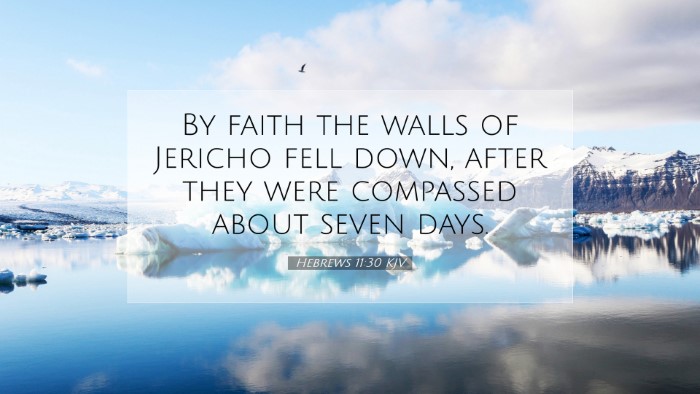Hebrews 11:30 Commentary
Bible Verse: "By faith the walls of Jericho fell down, after they were compassed about seven days."
Introduction
The epistle to the Hebrews is rich in faith narratives, drawing extensively from the Old Testament to illustrate the profound role faith plays in the life of believers. Hebrews 11:30 focuses on the Israelites' impressive act of faith leading to the miraculous downfall of Jericho's walls, a pivotal event that marks both a spiritual and military victory for the Israelites. This commentary draws insights from notable public domain commentaries to aid theologians, pastors, and students in unpacking the significance of this verse.
Contextual Background
In understanding Hebrews 11:30, it is crucial to note that it resides within a chapter often referred to as the "Hall of Faith." The author emphasizes the faith of various Biblical figures, illustrating the essence of belief in God's promises. The account of Jericho falls under the leadership of Joshua, a figure of faith and obedience, embodying the trust the Israelites had in God's plans.
Faith in Action
Matthew Henry emphasizes the fundamental connection between faith and action. He comments that it is not mere belief that led to the fall of Jericho, but an active faith demonstrated through obedience. The Israelites were instructed to march around the city for seven days, and their persistence is a testament to their faith. This highlights that true faith often requires an obedience that may seem illogical or challenging.
The Seven Days of Marching
Albert Barnes notes the significance of the seven-day period of encirclement. Each day represented a step of obedience, and the cumulative effect of these actions in faith culminated in divine intervention. The act of circling the city can be viewed as a spiritual exercise, reinforcing the idea that faith requires both time and commitment.
Spiritual Significance
Adam Clarke suggests that the event at Jericho holds profound spiritual implications—it symbolizes the power of faith in overcoming formidable barriers. The walls of Jericho represent the obstacles believers face, while their fall emphasizes that through faith, even the most daunting challenges can be surmounted. Clarke also likens this event to the spiritual battles Christians face today, where faith and obedience play crucial roles in spiritual warfare.
The Role of Joshua
Joshua's exemplary leadership is worth mentioning, as highlighted by various commentators. His unwavering faith set the tone for the Israelite community. Matthew Henry reflects that Joshua not only led the army into battle but also demonstrated what it means to trust completely in God’s guidance. This teaches modern readers about the importance of spiritual leadership and collective faith in achieving God-given goals.
Lessons for Today
This verse conveys several lessons relevant for contemporary believers:
- The necessity of obedience: Genuine faith is accompanied by action, and obedience to God’s word is paramount.
- Faith’s transformative power: Just as the walls of Jericho fell, faith has the power to change circumstances significantly.
- The importance of community: The Israelites acted in unison, demonstrating that faith is often a communal endeavor.
- The call to perseverance: The act of marching for seven days illustrates that faith sometimes requires prolonged commitment before results are seen.
Conclusion
Hebrews 11:30 serves as a powerful reminder of the might of faith when combined with obedience. Each commentator provides a unique lens through which to view the implications of this verse, reinforcing the narrative that faith is not passive but an active, transformative force. For pastors, students, and theologians alike, the lessons drawn from Jericho inspire self-examination regarding the strength and sincerity of their faith, urging them to reflect on how they respond to the Divine call in their own lives.


